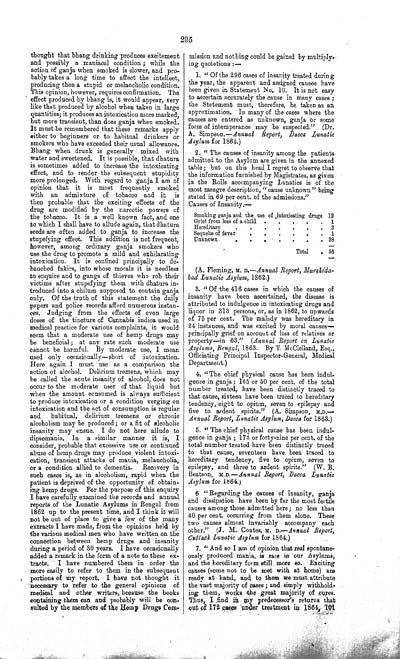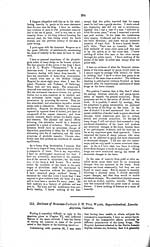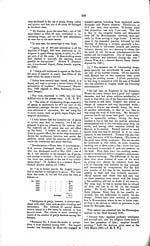Medicine - Drugs > Report of the Indian Hemp Drugs Commission, 1894-1895 > Volume IV
(309) Volume 4, Page 295
Thumbnail gallery: Grid view | List view

295
thought that bhang
drinking produces excitement
and possibly a maniacal condition; while the
action of ganja when smoked is slower, and pro-
bably takes a long time to affect the intellect,
producing then a stupid or melancholic condition.
This opinion, however, requires confirmation. The
effect produced by bhang is, it would appear, very
like that produced by alcohol when taken in large
quantities; it produces an intoxication more marked,
but more transient, than does ganja when smoked.
It must be remembered that these remarks apply
either to beginners or to habitual drinkers or
smokers who have exceeded their usual allowance.
Bhang when drunk is generally mixed with
water and sweetened. It is possible, that dhatura
is sometimes added to increase the intoxicating
effect, and to render the subsequent stupidity
more prolonged. With regard to ganja I am of
opinion that it is most frequently smoked
with an admixture of tobacco and it is
then probable that the exciting effects of the
drug are modified by the narcotic powers of
the tobacco. It is a well known fact, and one
to which I shall have to allude again, that dhatura
seeds are often added to ganja to increase the
stupefying effect. This addition is not frequent,
however, among ordinary ganja smokers who
use the drug to promote a mild and exhilarating
intoxication. It is confined principally to de-
bauched fakirs, into whose morals it is needless
to enquire and to gangs of thieves who rob their
victims after stupefying them with dhatura in-
troduced into a chilum supposed to contain ganja
only. Of the truth of this statement the daily
papers and police records afford numerous instan-
ces. Judging from the effects of even large
doses of the tincture of Cannabis indica used in
medical practice for various complaints, it would
seem that a moderate use of hemp drugs may
be beneficial; at any rate such moderate use
cannot be harmful. By moderate use, I mean
used only occasionally—short of intoxication.
Here again I must use as a comparison the
action of alcohol. Delirium tremens, which may
be called the acute insanity of alcohol, does not
occur to the moderate user of that liquid but
when the amount consumed is always sufficient
to produce intoxication or a condition verging on
intoxication and the act of consumption is regular
and habitual, delirium tremens or chronic
alcoholism may be produced; or a fit of alcoholic
insanity may ensue. I do not here allude to
dipsomania. In a similar manner it is, I
consider, probable that excessive use or continued
abuse of hemp drugs may produce violent intoxi-
cation, transient attacks of mania, melancholia,
or a condition allied to dementia. Recovery in
such cases is, as in alcoholism, rapid when the
patient is deprived of the opportunity of obtain-
ing hemp drugs. For the purpose of this enquiry
I have carefully examined the records and annual
reports of the Lunatic Asylums in Bengal from
1862 up to the present time, and I think it will
not be out of place to give a few of the many
extracts I have made, from the opinions held by
the various medical men who have written on the
connection between hemp drugs and insanity
during a period of 30 years. I have
occasionally
added a remark in the form of a note
to these ex-
tracts. I have numbered them in order the
more easily to refer to them in the subsequent
portions of my report. I have not thought it
necessary to refer to the general opinions of
medical and other writers, because the books
containing them can and probably will be con-
sulted by the members of the Hemp Drugs Com-
mission and nothing could be
gained by multiply-
ing quotations:—
1. "Of the 296
cases of insanity treated during
the year, the apparent and assigned causes have
been given in Statement No. 10. It is not easy
to ascertain accurately the cause in many cases;
the Statement must, therefore, be taken as an
approximation. In many of the cases where the
causes are entered as unknown, ganja or some
form of intemperance may be suspected." (Dr.
A. Simpson.—Annual Report, Dacca Lunatic
Asylum for 1862.)
2. "The causes of
insanity among the patients
admitted to the Asylum are given in the annexed
table; but on this head I regret to observe that
the information furnished by Magistrates, as given
in the Rolls accompanying Lunatics is of the
most meagre description, "cause unknown" being
stated in 69 per cent. of the admissions."
Causes of Insanity.—
|
Smoking ganja and the use of intoxicating drugs |
12 |
|
Grief from loss of a child |
1 |
|
Hereditary |
3 |
|
Sequelæ of fever |
1 |
|
Unknown |
38 |
|
Total |
55 |
(A. Fleming, M.
D.—Annual Report, Murshida-
bad Lunatic Asylum, 1862.)
3. "Of the 416
cases in which the causes of
insanity have been ascertained, the disease is
attributed to indulgence in intoxicating drugs and
liquor in 313 persons, or, as in 1862, to upwards
of 75 per cent. The malady was hereditary in
24 instances, and was excited by moral causes—
principally grief on account of loss of relatives or
property—in 63." (Annual Report on Lunatic
Asylums, Bengal, 1863. By T. McClelland, Esq.,
Officiating Principal Inspector-General, Medical
Department.)
4. "The chief
physical cause has been indul-
gence in ganja; 165 or 50 per cent. of the total
number treated, have been distinctly traced to
that cause, sixteen have been traced to hereditary
tendency, eight to opium, seven to epilepsy and
five to ardent spirits." (A. Simpson, M.D.—
Annual Report, Lunatic Asylum, Dacca for 1863.)
5. "The chief
physical cause has been indul-
gence in ganja; 173 or forty-nine per cent. of the
total number treated have been distinctly traced
to that cause, seventeen have been traced to
hereditary tendency, five to opium, seven to
epilepsy, and three to ardent spirits." (W. B.
Beatson, M.D.—Annual Report, Dacca Lunatic
Asylum for 1864.)
6 "Regarding the causes
of insanity, ganja
and dissipation have been by far the most fertile
causes among those admitted here; no less than
40 per cent. occurring from them alone. These
two causes almost invariably accompany each
other." (J. M. Coates, M. D.—Annual Report,
Cuttack Lunatic Asylum for 1864.)
7. "And so I am of
opinion that real spontane-
ously produced mania, is rare in our Asylums,
and the hereditary form still more so. Exciting
causes (some not to be met with at home) are
ready at hand, and to them we must attribute
the vast majority of cases; and simply withhold-
ing them, works the great majority of cures.
Thus, I find in my predecessor's returns that
out of 172 cases under treatment in 1864, 101
Set display mode to: Large image | Zoom image | Transcription
Images and transcriptions on this page, including medium image downloads, may be used under the Creative Commons Attribution 4.0 International Licence unless otherwise stated. ![]()
| India Papers > Medicine - Drugs > Report of the Indian Hemp Drugs Commission, 1894-1895 > Volume IV > (309) Volume 4, Page 295 |
|---|
| Permanent URL | https://digital.nls.uk/74552868 |
|---|---|
| Description | Evidence of Bengal witnesses. |
| Description | Volume 4: Evidence of witnesses from Bengal and Assam. |
|---|---|
| Attribution and copyright: |
|




